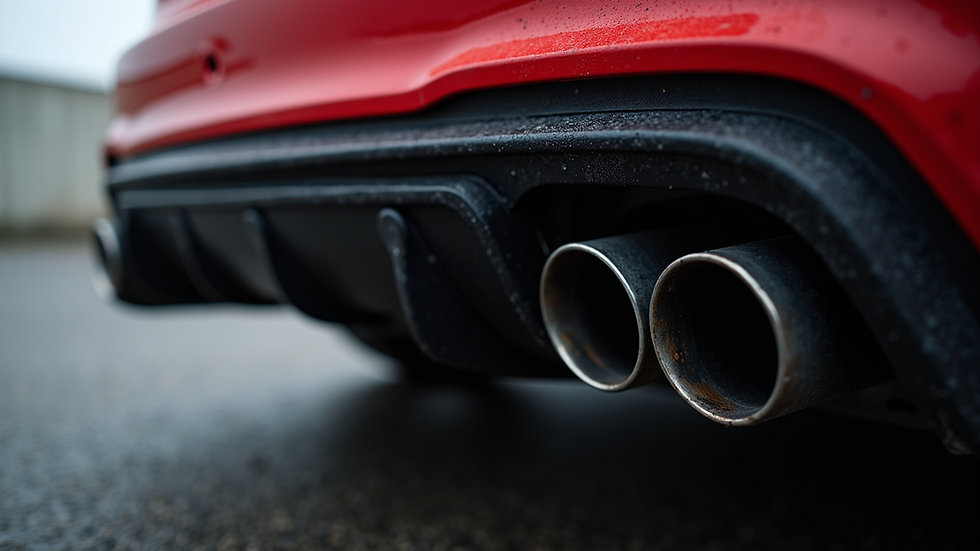Top Car Modification Tips for DIY Enthusiasts
- Zachary Petty
- Jul 31
- 4 min read
Car modification is an exciting journey for many DIY enthusiasts. Whether you want to enhance performance, improve aesthetics, or simply make your vehicle unique, there are countless ways to personalize your ride. This blog post will guide you through some of the best car modification tips that can help you get started on your project.
From simple upgrades to more complex changes, we will cover a variety of modifications that can suit different skill levels and budgets. So, grab your tools and let’s dive into the world of car modifications!
Understanding Your Vehicle
Before you start modifying your car, it is essential to understand its current state.
Know Your Model: Research your car model to understand its strengths and weaknesses. This knowledge will help you decide which modifications will be most beneficial.
Check the Manual: Your vehicle's manual contains valuable information about specifications and limitations.
Assess Your Goals: Determine what you want to achieve with your modifications. Are you looking for better performance, improved fuel efficiency, or a more stylish appearance?
Understanding your vehicle will set a solid foundation for your modification journey.
Start with Simple Modifications
If you are new to car modifications, starting with simple upgrades can build your confidence.
Air Filters: Upgrading to a high-performance air filter can improve airflow to the engine, enhancing performance.
Exhaust Systems: A new exhaust system can not only improve performance but also give your car a more aggressive sound.
Tires: Investing in quality tires can significantly improve handling and safety.
These modifications are relatively easy to install and can provide noticeable improvements.
Suspension Upgrades
Upgrading your suspension can dramatically change how your car handles.
Lowering Springs: These can lower your car's center of gravity, improving handling and giving it a sportier look.
Shock Absorbers: High-quality shock absorbers can enhance ride quality and handling.
Sway Bars: Adding sway bars can reduce body roll during cornering, making your car feel more stable.
Suspension upgrades can be a bit more complex, but they are worth the effort for the performance benefits.
Performance Enhancements
For those looking to boost their car's performance, consider these modifications.
ECU Tuning: Reprogramming your car's engine control unit can unlock additional horsepower and torque.
Turbochargers and Superchargers: These forced induction systems can significantly increase engine power.
Performance Chips: Installing a performance chip can optimize fuel efficiency and power output.
These enhancements can be more technical, so ensure you have the right tools and knowledge before proceeding.
Aesthetic Modifications
Making your car look good is just as important as performance.
Body Kits: Adding a body kit can give your car a unique and aggressive appearance.
Paint and Wraps: A fresh coat of paint or a vinyl wrap can completely change your car's look.
Lighting: Upgrading to LED lights or adding underglow can enhance your car's aesthetics.
Aesthetic modifications allow you to express your personality and style.
Interior Upgrades
Don’t forget about the inside of your car.
Seats: Upgrading to sport seats can improve comfort and support during driving.
Steering Wheel: A new steering wheel can enhance your driving experience and add a sporty touch.
Sound System: Upgrading your sound system can make your drives more enjoyable.
Interior upgrades can make your car feel more personalized and comfortable.
Safety Modifications
Safety should always be a priority when modifying your car.
Brakes: Upgrading to high-performance brake pads and rotors can improve stopping power.
Roll Cages: If you plan to take your car to the track, consider installing a roll cage for added safety.
Lighting: Ensure your headlights and taillights are bright and functional for better visibility.
Safety modifications can provide peace of mind while driving.
Tools and Equipment
Having the right tools is crucial for any DIY project.
Basic Tools: A good set of wrenches, screwdrivers, and pliers is essential.
Jack and Stands: These are necessary for working underneath your car safely.
Diagnostic Tools: An OBD-II scanner can help you troubleshoot issues and monitor performance.
Investing in quality tools will make your modification projects easier and more enjoyable.
Research and Community
Before starting any modification, do your research.
Online Forums: Join car enthusiast forums to learn from others' experiences.
YouTube Tutorials: Many DIY enthusiasts share their projects on YouTube, providing step-by-step guides.
Local Car Clubs: Connecting with local car clubs can provide support and inspiration.
The car modification community is vast and can be a great resource for learning and sharing ideas.
Legal Considerations
Before making modifications, be aware of local laws and regulations.
Emissions Standards: Some modifications may affect your car's emissions.
Insurance: Check with your insurance provider to ensure your modifications are covered.
Safety Inspections: Some modifications may require a safety inspection to remain street legal.
Understanding the legal aspects of car modifications can save you from potential issues down the road.
Final Thoughts
Car modification is a rewarding hobby that allows you to express your creativity and improve your vehicle.
By starting with simple upgrades and gradually working your way up to more complex modifications, you can enjoy the process while enhancing your car's performance and appearance.
Remember to prioritize safety, do your research, and connect with the community.
With the right approach, your car can become a true reflection of your personality and passion for automotive excellence.





Comments